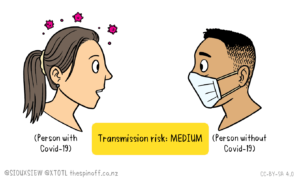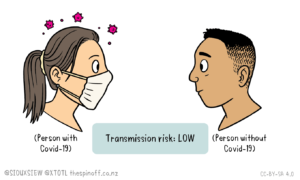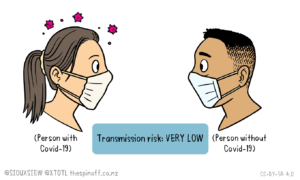Effectiveness of masks?
There’s a new study from Denmark that, if you don’t read carefully, looks like it has found evidence that masks don’t work to stop Covid. You’ll probably be hearing about it. [Update: on Newshub now] Here’s the NYTimes take.
The study randomly allocated 5000 people to wear masks or not, and found 42 people with antibodies to the Covid virus in the mask group and 53 in the no-mask group. From the abstract, the researcher concluded
The recommendation to wear surgical masks to supplement other public health measures did not reduce the SARS-CoV-2 infection rate among wearers by more than 50% in a community with modest infection rates, some degree of social distancing, and uncommon general mask use.
The results for actual diagnosed infection were a bit better: 5 vs 10.
Let’s look at the ‘limitations’ reported in the abstract
Inconclusive results, missing data, variable adherence, patient-reported findings on home tests, no blinding, and no assessment of whether masks could decrease disease transmission from mask wearers to others. [emphasis added]
So, based on a study that was too small, they argue that a mask doesn’t reduce your personal chance of being infected by more than half, and they didn’t look at whether it reduces your risk of infecting other people.
In NZ, our mask advice (and, from today, rules) is based on the benefits both ways, but more on reducing your risk to other people. Here’s the message from Toby Morris and Siouxsie Wiles
and
and
It’s hard to get rigorous evaluations of the benefits of masks. Most of the evidence we have comes from theory (it stops droplets, so it should reduce infection), from individual examples (eg two hair stylists who didn’t infect any of their clients), and from comparisons of trends between countries, states, and counties with different polices.
There are good reasons to believe masks reduce risk. It would be nice to have the sort of evidence we have for the new vaccines, but that’s not going to happen — and at least masks are safe and only slightly annoying.
Thomas Lumley (@tslumley) is Professor of Biostatistics at the University of Auckland. His research interests include semiparametric models, survey sampling, statistical computing, foundations of statistics, and whatever methodological problems his medical collaborators come up with. He also blogs at Biased and Inefficient See all posts by Thomas Lumley »



I kinda like this low brow experiment
https://www.youtube.com/watch?v=x6cTDGqcUpA
(Don’t try this at home!!!!!!!!!!!!!!!!!!!!!)
3 years ago
“…missing data, variable adherence, patient-reported findings ….” is the bane of a lot of studies where they are interested in how much of a type of food a person has or even how many ‘cups of coffee a day’ or alcoholic drinks per day.
https://en.wikipedia.org/wiki/Data_dredging
3 years ago
As you suggest Thomas, isn’t the idea of masks to protect others? I have never felt it protected me. It is a matter of not sneezing my Covid shit all over the tram (if I happen to be the 1 in 1000 who might have it at any particular time). Not sure how you can ever trial this effect without randomising regions and preventing people from moving around.
3 years ago
I think the current view is that it does protect you as well, but the effect is less dramatic.
3 years ago
Do you know if there is someone having compared the wearing mask dilemma to the prisoner dilemma problem?
3 years ago
But it’s not a dilemma: wearing a mask is beneficial both for you and for other people no matter whether other people are wearing one.
There is a nice historical analogy, of the sort that in other circumstances appeals to right-wing Americans, from Ancient Greek history
When someone asked why they visited disgrace upon those among them who lost their shields, but did not do the same thing to those who lost their helmets or their breastplates, he said, “Because these they put on for their own sake, but the shield for the common good of the whole line.” (Plut. Mor. 220A)
3 years ago